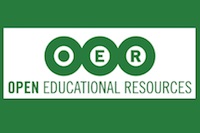Assessing the Savings from Open Educational Resources on Student Academic Goals
 Our study found that most students considered OER to be as good or better in terms of quality and engagement as traditional texts, while also allowing them to put saved funds toward their educational pursuits. As rising costs in higher education affect current and potential students, faculty and students are looking for ways to cut costs where possible. Open educational resources (OER) are a viable option to replace expensive traditional textbooks without sacrificing quality. This article presents the results of a study conducted with students at a Virginia community college who took courses that used OER. At the end of the semester, students were asked to rate their perceptions of the OER quality and their level of engagement with OER as compared to traditional textbooks. Results indicate that a majority of students found the OER to be as good as or better than traditional textbooks in both quality and engagement. While similar studies have been conducted, this study also asked students to briefly describe how they used the money saved by not having to purchase a textbook. Many students indicated they used the money to reinvest in their education by paying tuition, purchasing materials for other courses, or taking additional courses; day-to-day expenses and savings were the next most common responses. Further research needs to be conducted to understand the effect these savings and reinvestment have on students’ completion of academic goals.
Our study found that most students considered OER to be as good or better in terms of quality and engagement as traditional texts, while also allowing them to put saved funds toward their educational pursuits. As rising costs in higher education affect current and potential students, faculty and students are looking for ways to cut costs where possible. Open educational resources (OER) are a viable option to replace expensive traditional textbooks without sacrificing quality. This article presents the results of a study conducted with students at a Virginia community college who took courses that used OER. At the end of the semester, students were asked to rate their perceptions of the OER quality and their level of engagement with OER as compared to traditional textbooks. Results indicate that a majority of students found the OER to be as good as or better than traditional textbooks in both quality and engagement. While similar studies have been conducted, this study also asked students to briefly describe how they used the money saved by not having to purchase a textbook. Many students indicated they used the money to reinvest in their education by paying tuition, purchasing materials for other courses, or taking additional courses; day-to-day expenses and savings were the next most common responses. Further research needs to be conducted to understand the effect these savings and reinvestment have on students’ completion of academic goals.
International Review of Research in Open and Distributed Learning







